Social Work News
Syracuse University’s Highest Honor
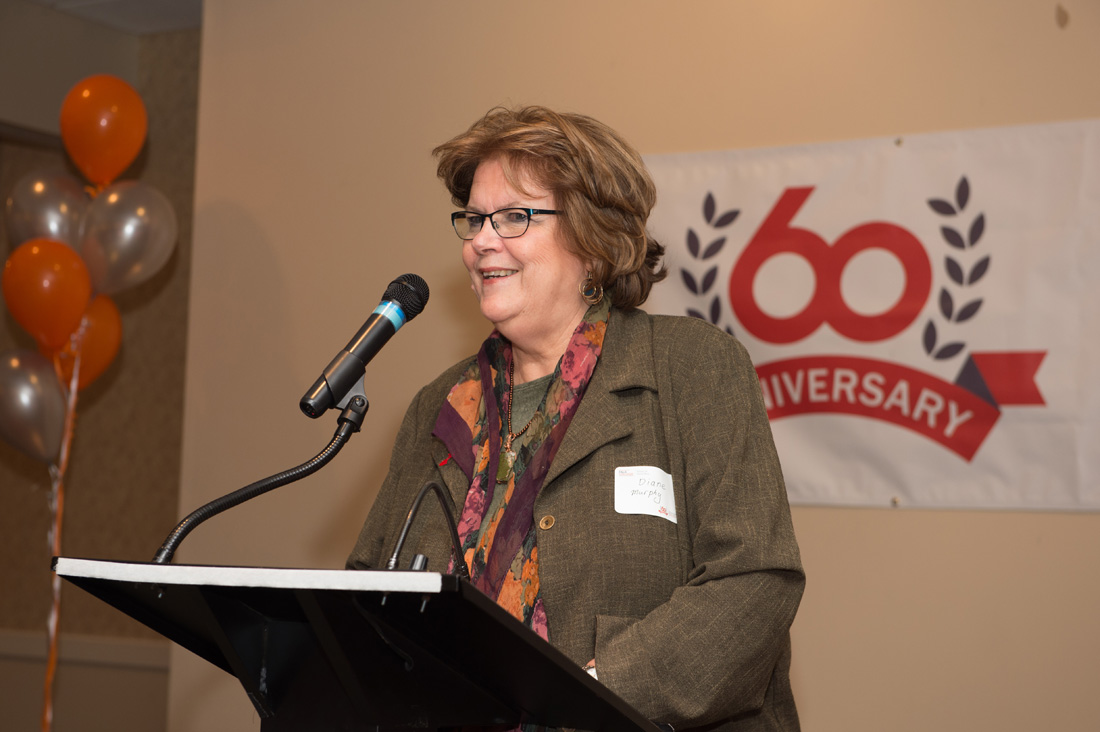
Diane Lyden Murphy, dean of the Falk College of Sport and Human Dynamics, received Syracuse University’s highest honor–the Chancellor’s Medal–at the One University Awards Ceremony April 21 at Hendricks Chapel.
The Chancellor’s Medal is awarded to individuals in honor of their trailblazing and extraordinary contributions to the University, to an academic body of knowledge, or to society. Dean Murphy, who was appointed Dean of the College of Human Services and Health Professions (now Falk) in May 2005, checks all three boxes.
“This medal is given for the very things Diane has always done here: extraordinary contributions to the University, to the community, to academic knowledge,” Chancellor Kent Syverud said before presenting the Chancellor’s Medal to Dean Murphy. “She’s done those things, but she’s also done one thing that’s even rarer and worth celebrating and I can say this from experience, she has consistently and faithfully had the courage to speak up.
“She’s had the courage to speak up, including to chancellors, when things are not right, when they could be better, and even more rare is that after speaking up she has the integrity to roll up her sleeves and actually work to make them better,” Chancellor Syverud added.
Dean Murphy was one of several 2022-23 award recipients who were honored at the April 21 ceremony. Watch the video of the Chancellor’s Medal presentation here:
Dean Murphy received four degrees at the University and joined the faculty in the School of Social Work in 1978. Prior to her appointment at Falk, Dean Murphy served 17 years as director of the Women’s Studies program in the College of Arts and Sciences.
Dean Murphy’s many contributions to the University include co-authoring the University’s sexual harassment policy; initiating studies of gender pay equity; developing adoption and domestic partner benefits; and creating a family-friendly environment for students, faculty, and staff.
Chancellor Syverud started his remarks by reading a news release from January 1973 about Dean Murphy’s appointment as a personnel intern in the Office of Student Affairs who would “specialize in the problem of married students.” She served as a liaison between married students and the administration and from that work arose the first childcare center on campus.
“There have been a lot of initiatives in the last 50 years at Syracuse University to help people and populations in our community,” Chancellor Syverud said. “There have been precious few where Diane Lyden Murphy has not been present and accounted for in support of doing the hard work and listening and doing the problem-solving and speaking up to make things better.
“We talk about diversity, equity, inclusion, accessibility, and support for survivors, Diane was there often before most of the world had developed the vocabulary to describe the problem and the opportunity,” Chancellor Syverud added. “Going back to that first press release, Diane never regarded married students as a problem, she never regarded these things as problems, she regarded them as opportunities. And boy, she’s made an impact on this University! I can’t imagine what this place would be like today without her work, but I’m certain it would be a less accomplished and a colder and less just and less human place.”
The Chancellor’s Medal is the latest in an extensive list of awards Dean Murphy has received while at the University, including the Excellence in Graduate Education Award from the Graduate School, the Francis McMillan Parks Women of Influence Award, and a Chancellor’s Citation. In 2005, the Women’s Studies Program established the Diane Lyden Murphy Women’s Studies Activism Award in her honor.
‘Lineage of Advocacy’
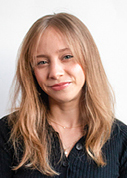
Ten Syracuse University students/alumni have been named as 2023 recipients of awards through the Fulbright U.S. Student Program.
The program funds a range of awards that include English teaching assistantships (ETA) and study/research grants in over 140 countries. All of this year’s Syracuse recipients received teaching assistantships.
One of these recipients is a Falk College student, Sarah Bennett ’20, G’22, is a philosophy and psychology alumna in the College of Arts and Sciences and master’s of social work alumna in the Falk College.
Bennett will teach English at a Polish university and plans to support refugee aid initiatives. She also plans to engage with creative writing communities. “I know firsthand that poetry can offer an affirming space for cultural expression and exchange,” she says. “In Poland, I hope to join or create a space for writers to come together and share their work.”
Her time in Poland will also be personal. This year, she uncovered an autobiography written by her great-grandfather, which chronicled his life as a teacher, scholar and political activist with the General Jewish Labor Bund in his hometown of Łódź. “There has been a long lineage in my family of writing, teaching and advocacy,” she says. “I hope to follow this familiar pull as a Fulbright ETA in Poland while connecting with a culture and history I am eager to know better.”
The Center for Fellowship and Scholarship Advising (CFSA) supports current undergraduates, graduate students and alumni in Fulbright applications. Students interested in applying to the Fulbright program should contact CFSA at 315.443.2759 or cfsa@syr.edu.
Interested students should open an application on the Fulbright portal by June 1. The campus deadline for the 2023-24 application cycle is Sept. 12.
Class of 2023 Social Work Awards
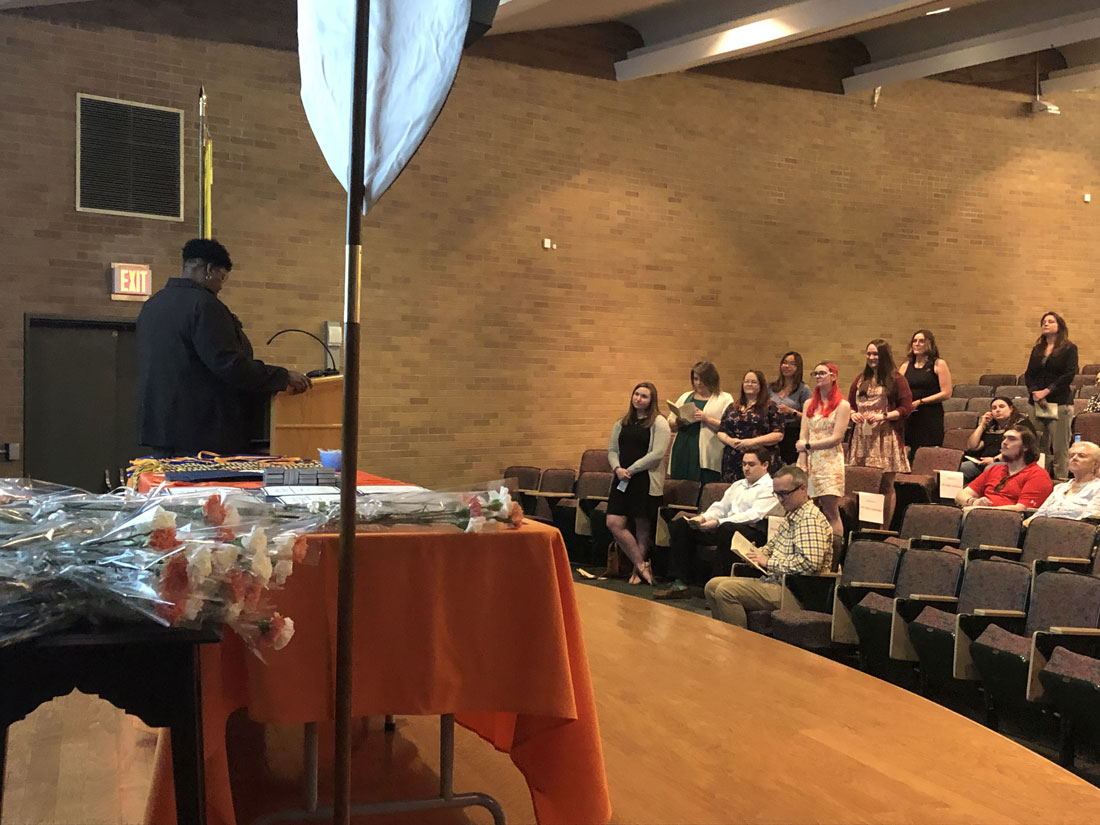
The School of Social Work in Falk College would like to recognize and congratulate its Class of 2023 undergraduate and graduate award winners! Here’s a list of the winners, a description of the award, and comments about the awardees from Social Work faculty:
Keith Alford Diversity and Inclusion Award – Khin Aung and Ashley Homer
The Keith Anthony Alford Diversity and Inclusion award is named in honor of Dr. Keith Alford, formerly the Syracuse University Chief Diversity and Inclusion Officer (2018-2021), M.S.W. Program Director (2016-2018), B.S.S.W. Program Director (2008-2012), and Director of the School of Social Work (2016-2019).
Khin Aung (undergraduate)
“Khin came from a Thai refugee camp. Her native country is Myanmar (Burma), and she now lives with her family in Syracuse. Khin is doing her social work internship at Interfaith Works to gain work experience and serve the immigrant and refugee populations. Her goal is to make the best of her education and use the skills she has acquired to best serve the immigrant and refugee populations as a social worker.”
Ashley Homer (graduate)
“Ashley, a native of Syracuse, is focusing on clinical practice. Ashley currently works as a social work intern at Corcoran High School in Syracuse, where she attended. Ashley intends to work in a position that will enable her to continue supporting youth who face social challenges and serve as a liaison between this population and community resources.”
Elizabeth Brown Thoreck Undergraduate Student Achievement Award – Chevon Janczuk
Awarded to a non-traditional aged undergraduate student who is in good academic standing in the academic arena and field placement setting.
“Chevon is currently employed with Liberty Resources in its developmental disabilities department as a direct support professional who provides community habilitation. She is also employed with Community Action Partnership in Canastota, New York, as a housing facilitator who supports the homeless population. Her interests in the social work field are within the criminal justice system and military population. Chevon will complete her M.S.W. at Syracuse. She will intern at the Veteran Justice Outreach program in Auburn, New York, where they provide services to veterans within, and recently released from, the criminal justice system.”
Bachelor of Science in Social Work Award – Alexandra Vroman
Awarded to a School of Social Work graduating senior in good academic standing who is involved in social work activities, serves the community, and makes meaningful contributions to Syracuse University.
“Alexandra has loved spending her senior year interning at Webster Elementary School and discovering her passion for school social work. After graduating with her B.S.W. and bachelor’s in psychology, she will attend Syracuse University’s Advanced Standing M.S.W. program and intern at SUNY Upstate’s Child and Adolescent Outpatient Psychiatry Clinic. She is excited to continue her social work education and work toward clinical licensure.”
Scholastic Excellence Award, Undergraduate – Emily Clapper
Awarded to the student with the highest cumulative GPA among graduating seniors.
“Emily is a current intern at Toomey Residential and Community Services, where she spends most of her time engaging with clients in the Children’s Community Residence program, a residential facility for children and adolescents with significant mental and behavioral health diagnoses. Upon graduation, Emily will continue her education at the Boston College School of Social Work in their Advanced Standing Master of Social Work program with a concentration in children, youth, and families.”
Catherine Mary Esposito Achievement Award – Emily Schaefer and Kallie Minarik
The Catherine Mary Esposito award is presented to outstanding undergraduate and graduate students who have demonstrated a commitment to clients with developmental disabilities and are in good academic standing, but more importantly have had success working with people with developmental disabilities.
Emily Schaefer (undergraduate)
“Emily is a social work intern at the Jowonio School, an inclusive preschool serving children of all needs. Upon graduation, Emily will continue her education at Fordham Graduate School of Social Service in their Advanced Standing Master of Social Work program. Emily is extremely passionate about creating a more inclusive environment for all children.”
Kallie Minarik (graduate)
“Kallie took part in the behavioral health department for her field placement. She worked with clients individually, with families, and with groups. Kallie currently wants to work with clients and families between infant mental health and veterinary social work. She states that although this will be working with ‘two completely different areas, that is the beauty of social work.’”
Rhonda B Cohen Prize in Gerontology Award – Jacob Handanyan and Peter Hernandez
The Rhonda B. Cohen Prize in Gerontology is named in honor of Rhonda Cohen, who graduated from the M.S.W. program in 1983 and passed away at a young age. She was an advocate for the elderly. The award criteria include cumulative GPA, community service, and an interest in working with older adults.
Jacob Handanyan (undergraduate)
“Jacob is currently completing his undergraduate field placement at Syracuse Jewish Family Services, working with the aging population and differently abled individuals, and conducting group and individual visits. Jake intends to continue his education at Syracuse University to complete his master’s in social work.”
Peter Hernandez (graduate)
“Peter’s first placement was working with the elderly at an assisted living home, and his second placement was working with children with disabilities. He has worked with high-needs children and on suicide prevention with veterans. Peter is currently the Social Services Director for a nursing and rehabilitation home, and his future plans involve pursuing his L.C.S.W. and providing services to adults.”
Virginia Insley Award – Andrew Carroll (graduate)
Awarded to an outstanding Social Work M.S.W. Health Care Concentration student who is interested in maternal and child health.
“Andrew is currently interning at the Upstate Child and Adolescent Psychiatry Clinic. This pertains to his interest and goals and has been very helpful in cultivating an enriching learning environment that he intends to use in clinical practice going forward. Andrew has found this to be an invaluable experience and plans to apply the plethora of knowledge he has gained to his future work, always striving to identify and implement unique treatment modalities to best meet the unique needs of his clients.”
Carrie Jefferson Smith Social Justice Award – Kathryn Scully (graduate)
Awarded to a student who has demonstrated a commitment to social justice, particularly in improving the lives of victims impacted by the continuum of domestic violence.
“Kathryn is currently interning at Elmcrest Family Transitions (EFT), a program that is a specialized sexual abuse service. Kathryn works with youth in the community who have a history of problematic sexual behaviors and those who have been victims themselves. She recently interviewed for a full-time position at EFT, where she hopes to begin working after graduation.”
Mary Pat Cotter Remembrance Award – Malika Nobles (second-year graduate student)
Awarded to a School of Social Work graduate student for contributions to substance abuse and HIV/AIDS.
“Malika works at ACR Health, where she has held many different positions working with high-risk individuals with infectious diseases such as HIV/HCV. She currently interns at Credo Community Center in Watertown, New York, where they provide outpatient treatment services for individuals struggling with addiction. Credo’s mission, values, and philosophy on client-centered care spoke volumes to Malika and resonates with the type of social worker she hopes to become. Malika would like to one day open her own women’s safe haven, a nonprofit organization that epitomizes the lessons and experiences that both ACR Health and Credo Community Center have provided.”
Kenneth J. Marfilius Student Veteran Award – Jazmin C. Avila and Robert Ryan
The Kenneth J. Marfilius Student Veteran Award is presented to a graduate student in good academic standing who is a military veteran. The award is based on grade-point average, community involvement, and contributions to Syracuse University contributions.
Jazmin C. Avila (undergraduate)
“Jazmin completed her field placement at a therapeutic crisis response program that worked with youth who did not meet the criteria for inpatient but needed additional support navigating anxiety, depression, and other mental health concerns. Jazmin is an U.S. Army veteran hoping to work with adolescents who have experienced trauma, more specifically youth that are victims/survivors of sex trafficking.”
Robert Ryan (graduate)
“Robert is a U.S. Coast Guard Auxiliarist and U.S. Marine Corps veteran, and he is completing his M.S.W. internship at Confidential Help for Alcohol and Drugs (C.H.A.D.). He is president of Social Workers United, a member of the Student Veterans Organization, and a member of the University’s Diversity Committee. Robert is employed as the Cayuga County Democratic Deputy Elections Commissioner, and has future goals of becoming an L.C.S.W., earning a doctorate, and working in higher education.”
Interested in a career in social work? Visit the School of Social Work to learn more about its academic programs, experiential learning, and career opportunities.
‘Uplifting People’
In her distinguished career as a social worker, Jane Rockberger Bloom devoted her life to improving the lives of refugees who settled in the U.S.
Bloom, a 1969 Syracuse University alumna and engaged Falk College Advisory Board member, died in March 2022. But her mission to help others endures at the Falk College of Sport and Human Dynamics with the Jane Rockberger Bloom Social Scholarship in Refugee/Migration Services.
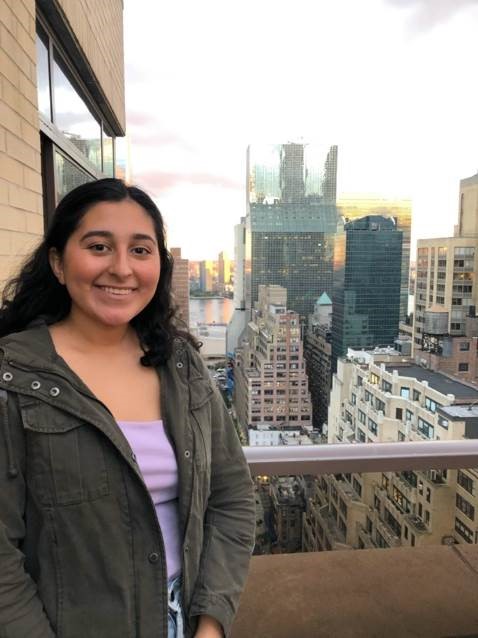
The 2022-23 recipient of the award was School of Social Work graduate student Salma Silvas, who received her bachelor’s degree in social work in 2020 from St. Edward’s University in Austin, Texas, before joining Syracuse University’s master’s program.
“As it was nearing time to apply to colleges and pick a major, I knew I had to help dismantle oppressive systems that hold people back,” Silvas says. “I found social work was the perfect match for me with the ability to work with different populations while uplifting people and gaining transferable skills.”
To learn more about Silvas, we asked about her hobbies, academic interests, and career aspirations. Here’s that conversation:
Q: Tell us about yourself–what do you like to do in your free time?
A: Being from a coastal community, I enjoy spending my time at the beach, walking along the coastline, and reading. Now that I attend school in Syracuse, I have had to adjust my hobbies slightly. Outside of academics, I enjoy hiking, admiring waterfalls, and the snow–I had only seen it a few times prior to moving here. I have pushed myself to move to a place where I did not know anyone, or anything, which has allowed me to gain more confidence in every aspect of my life.
Q: Why did you choose social work as a profession?
A: My grandfather made the journey from Mexico to this country decades ago in search of better opportunities for his family. Growing up in a Mexican American household and community, I saw first-hand how systems can sometimes work against communities of color. My parents instilled in me that going to school, having food, having a home, and having my basic needs met were all privileges that many people did not have.
Q: What are your academic interests and aspirations?
A: While obtaining my B.S.W., I fell in love with the aging population, which led me to my senior year internship at a skilled nursing facility. I am currently interning at Upstate Medical University (in Syracuse), previously with the palliative care unit and currently with inpatient psychiatric unit, where I find many intersections in aging, death, and dying. I strongly believe that all people, no matter their immigration or financial status, should have dignity when dying.
The aging and dying community are sometimes thrown to the side and viewed as a lost cause, but this is far from the truth. My academic interests lie in learning more about the aging, death, and dying population and how I can further engage and educate Latinx communities on the importance of preventative care and advanced care planning.
Q: What would like to say to the family of your scholarship sponsor, the late Jane Rockberger Bloom?
A: Navigating the post-undergraduate world can be difficult and confusing when there are a limited number of people in your community with graduate school experience. Being a first-generation college graduate, and a first-generation graduate student, fills me with immense pride.
I am so grateful that a portion of my financial burden for this academic year has been alleviated. I cannot accurately express my gratitude for this opportunity to continue to make my family and community proud. Thank you so much, and I will forever be grateful for your sponsorship!
Interested in a career in social work? Visit the School of Social Work webpage to learn more about its academic programs, experiential learning, and career opportunities. Visit the Awards and Scholarships webpage to learn more about the wide range of opportunities and awards that are available to Falk College students.
Those who would like to make a gift to the Jane Rockberger Bloom Social Scholarship in Refugee/Migration Services can make a secure gift online. To make a gift by check, please make it out to Syracuse University and mail to Falk College Advancement, 427 White Hall, Syracuse, NY 13244. If you have any questions, please contact David Salanger, Assistant Dean for Advancement and External Relations, at 315.443.4588 or dasalang@syr.edu, or Megan Myers, Director of Development, at 315.443.1817 or mmyers01@syr.edu.
Talking to Children

Tracey Marchese is a professor practice in the School of Social Work in Syracuse University’s Falk College. Her research specialties include trauma, PTSD, mental health and mind-body wellness.
She answers three questions below with advice on best ways to discuss traumatic events. She is available for additional questions and interviews.
Q: How should I approach the topic of a school shooting with my child or teen?
A: Children/adolescents may react differently to the news of a school shooting depending upon their age and previous exposure to news of school shootings. Younger children (those younger than about the age of 7) may not have as much awareness or understanding about the impact of a school shooting. Children that are about the age of 8 and older would benefit from having a discussion about it, especially if there is large-scale news coverage and the child will most likely hear about it in school. Adolescents may be more likely to want to talk about it more in depth.
You may simply ask the child if they’ve heard about it and take it from there. After initiating the discussion, adults should take on more of a listening role to see what the child needs instead of talking to the child about what they think the child needs to know. Addressing the needs that the child expresses – whether for more information, comfort, safety planning – will lead to more positive outcomes. Telling the child what the adults think they need to know can actually cause the child more anxiety.
Q: What should parents and caregivers keep in mind in how they talk about the event?
A: Adults need to be mindful about how they address their children’s safety concerns. We do not want to negate the child’s fears – telling the child that they shouldn’t feel scared will only serve to shut down communication. It is not appropriate to tell the child that they will never experience a school shooting because we do not know that. At the same time, we want to help them to feel safe enough so that they do not become fearful of going to school. It is okay to share that you may be feeling scared, too, and that you can work together on creating a plan to feel safer. Taking a proactive stance will help the child feel more in control.
Q: Do you have any other advice to offer?
A: One of the most important things to address before speaking to children is for the adults to first address their own feelings/fears/concerns. If the adult is visibly anxious or even just feeling uneasy, the child will pick up on that, regardless of what the adult tells them. Concerns can be addressed in a number of ways: getting support from friends and family, becoming educated about their local school district’s safety protocols, engaging in relaxation techniques to help regulate their feelings, and/or seeking help from a mental health professional if they are having ongoing trouble managing their feelings/concerns.
It is also important to check in with children to see how they are doing and to keep an eye out for any changes in behavior that may indicate that they are struggling. If a child is struggling, parents can reach out to the child’s guidance counselor, pediatrician, or a mental health professional for assistance.
Social Justice Awards March 30
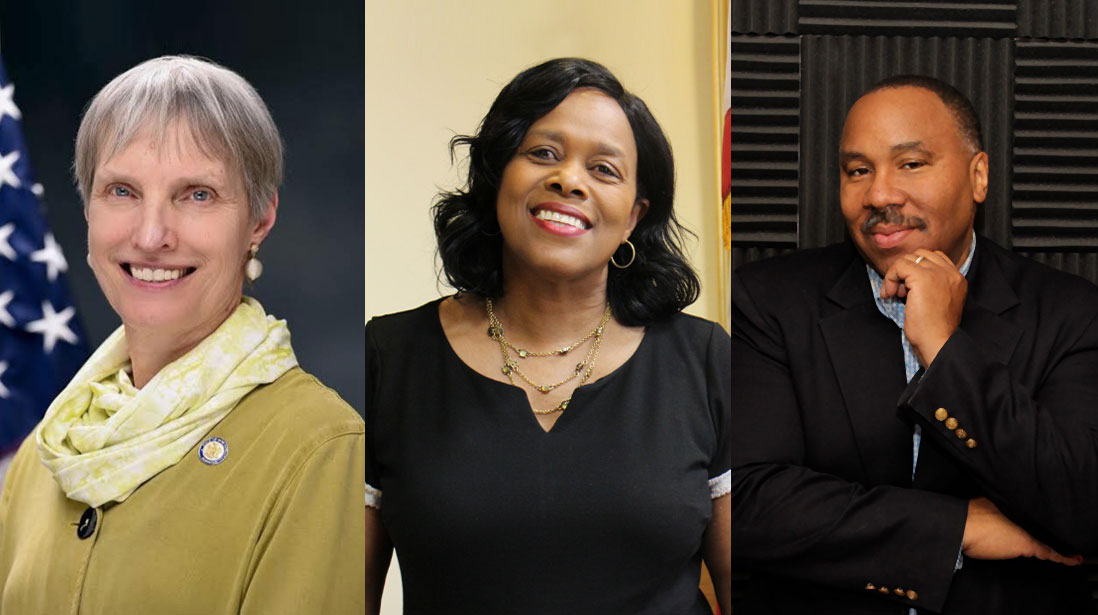
In commemoration of National Professional Social Work Month during March, the School of Social Work in Falk College will present its annual Dan and Mary Lou Rubenstein Social Justice Award program 6:45 – 8 p.m. March 30, 2023 in Falk College room 200. This year, the program “Empowering Communities Through Advocacy: Leadership at the State and Local Level,” honors the Hon. Rachel May, New York State Senator for the 48th District, and the Hon. Sharon Owens, Deputy Mayor of Syracuse. The ceremony will be led by George Kilpatrick, host of Inspiration for the Nation radio program.
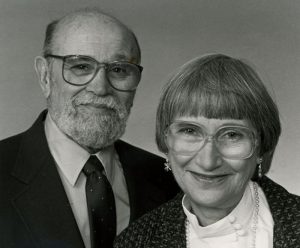
Presented for more than 30 years, the Rubenstein Social Justice Award is given in honor of the late professor Dan Rubenstein, a former faculty member in the School of Social Work and his late wife, Mary Lou, a former school social worker. Recipients of this award are role models whose courage and strength inspire others to stand up—and step up—to advocate and be a voice in the Syracuse community. The values of social justice are integral to their daily lives. The work of honorees each year, by their individual and collective examples, exemplify the true spirit of the Rubenstein Social Justice Award.
State Senator May is serving the City of Syracuse and areas of Onondaga and Cayuga County for her third straight term. Senator May ran for State Senate in 2018 after living in working in Syracuse as a professor. Senator May has been a strong advocate for bills that promote the healthy functioning of democracy. She uses her experience as an environmental professional to help draft climate change legislation. Senator May has advocated strongly for access to quality affordable home-based care for elders, and security and dignity for the people who care for them. Senator May has been a stalwart advocate for the city of Syracuse bringing legislators from around the state to Syracuse to support legislation that promotes economic opportunity in Syracuse and protect the rights and interests of vulnerable communities.
Deputy Mayor Owens has served the City of Syracuse through the Mayor’s office since 2017. Her portfolio of responsibilities includes emergency services, economic development, and neighborhoods. Deputy Mayor Owens has made social justice and racial justice one of the central pillars of her work as Deputy Mayor. She has spent her whole career serving families and communities in Syracuse. She worked for the Dunbar Association, Peace, Inc., and Early HeadStart promoting the wellbeing of children and families. She worked for Jubilee Homes and Home Headquarters seeking to ensure all residents have access to affordable homes in healthy communities. Deputy Mayor Owens also led the Southwest Community Center as a director. She has focused on a range of policies from promoting work opportunities for young people to expanding access to affordable housing.
The Social Justice Awards are free and open to the public. To register to attend, please visit the Syracuse University Community Calendar. For accommodations, please contact Kara Hughes at khughe07@syr.edu or (315) 443-5562.
‘Everything has a history,
And it matters’
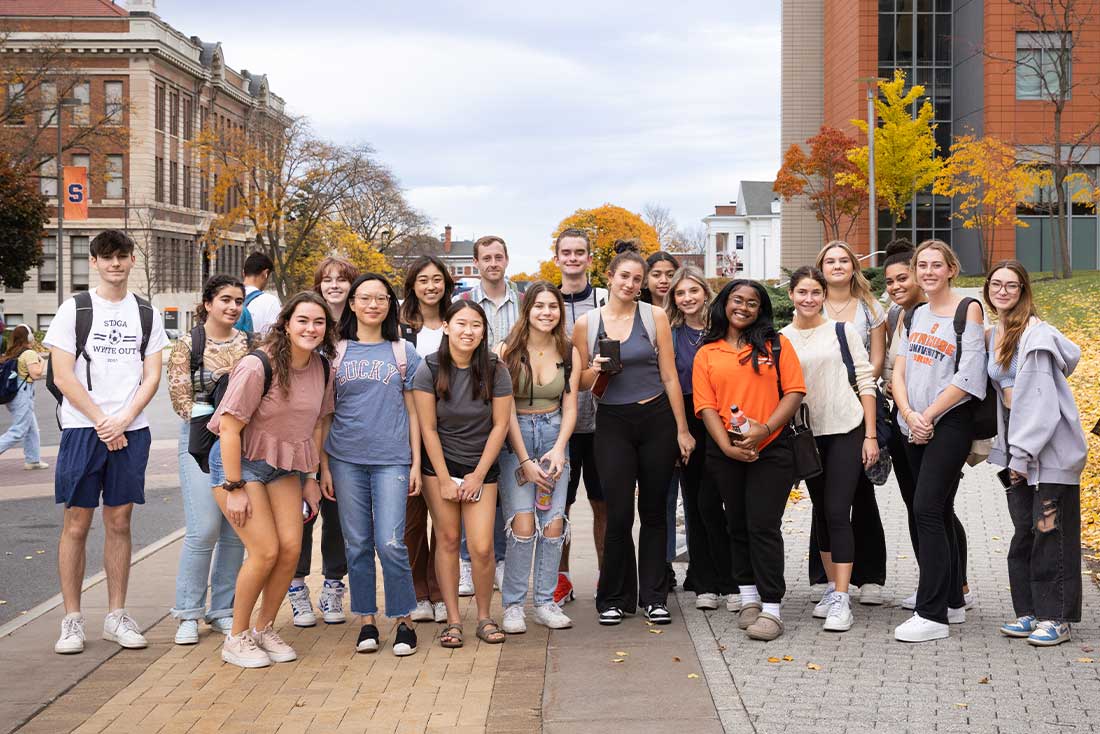
As James Baldwin so eloquently wrote, it is impossible to understand our present without acknowledging our past. And for 18 undergraduate students from the School of Social Work in Falk College, discovering the past and how it connects to the present was the purpose of their “Roots of Social Work” Onondaga Historical Association tour of the City of Syracuse in late October.
“We developed this opportunity to provide students historical context and help them make connections to contemporary social work practice in the City of Syracuse,” says Nadaya Brantley, Undergraduate Director and assistant teaching professor in the School of Social Work. “We want our students to develop consciousness and respect for the historical roots of social injustices experienced by those in our community.”
On the tour, the students learned from Robert Searing, Curator of History at the Onondaga Historical Association, about the thousands of primarily Black residents who at first were forced to live in the city’s 15th Ward, and then forced to leave their close-knit community filled with Black-owned houses and businesses to make way for the construction of Interstate 81.
“It became apparent to me that in order to understand the social, economic, and political issues that the city faces today, I would have to understand the history of Syracuse,” Social Work student Chyler Rosenberg wrote in an essay. “Learning about the destruction of the ward and the terrible effects it had on the community made me feel frustrated, but also eager to engage in a community that has been shaped by its unfair past and a very serious racial and economic divide.”
The students also learned of Syracuse’s deep connection to abolitionism, including Secretary of State Daniel Webster’s “Syracuse Speech” in 1850 warning the city to adhere to the Fugitive Slave Act; the minister at Wesleyan Methodist Church who assisted fugitive slaves; and the Jerry Rescue statue in Clinton Square that celebrates the 1851 rescue of William “Jerry” Henry, who was arrested for defying the Fugitive Slave Act but saved by a group of residents who freed him from the police station.
“I learned much more about the depth of history of Syracuse and its active, central, and open role in the abolitionist movement,” Social Work student Lily Kuzminski wrote. “Syracuse was an exceptional area for previously enslaved people or ‘freedom seekers’ to come for solace from slave states–a stop on the Underground Railroad used to move runaways to other areas of either upstate New York or Canada.”
Following the tour, Brantley asked the students to write a reflection essay that expressed their feelings about what they learned. Brantley says the assignment was designed for the students to think critically about the how a city’s history impacts current social work practices with its residents.
Here are excerpts from the essays from five students who were on the tour:
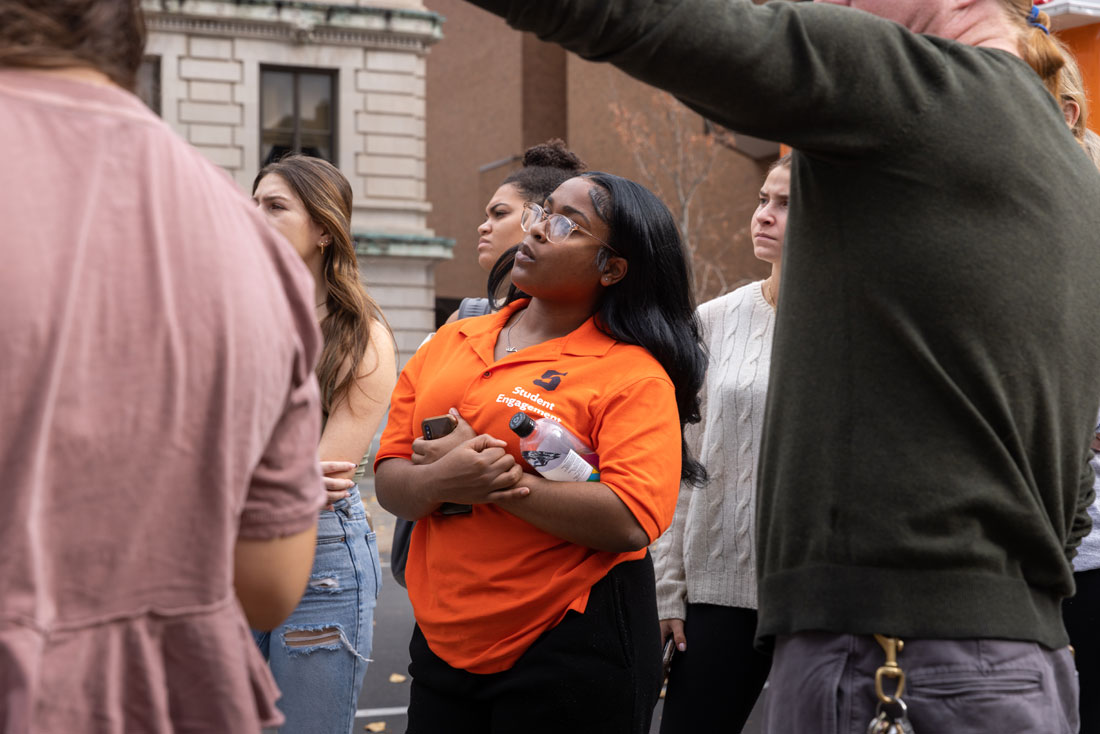
Amaya Saintal ’26
Syracuse fell victim to a displacement epidemic in 1938. The 15th Ward was a beautiful ethnic, cosmopolitan, polyglot community. It was home to many Jewish and Black businesses. Both ethnic groups were victims of prejudice and came together to create a safe space. In 1938, this ward was destroyed to create Pioneer Homes–one of the first of five public housing projects in the United States. Many families were left to figure out what to do next, and redlining was openly being used in Syracuse. Black families were stuck and eventually lived in impoverished conditions.
This information is relevant to me because when displacement occurs, the person’s well-being and basic human rights are denied. It creates high vulnerability and often increases discrimination and poverty. But also, it still influences the present day and is actively affecting communities in Syracuse.
Throughout the entire tour, I kept thinking about my home–Newark (New Jersey). The similarities in the economy, redlining, and poverty rates between both cities are daunting. The systemic issues are rooted deeply in both cities, and I felt moved to do something about it. Social workers are the trailblazers in helping people improve their well-being and create paths for contentment. Overall, the job is not easy but after touring Syracuse and its history, you see why the difficulty is worth it.
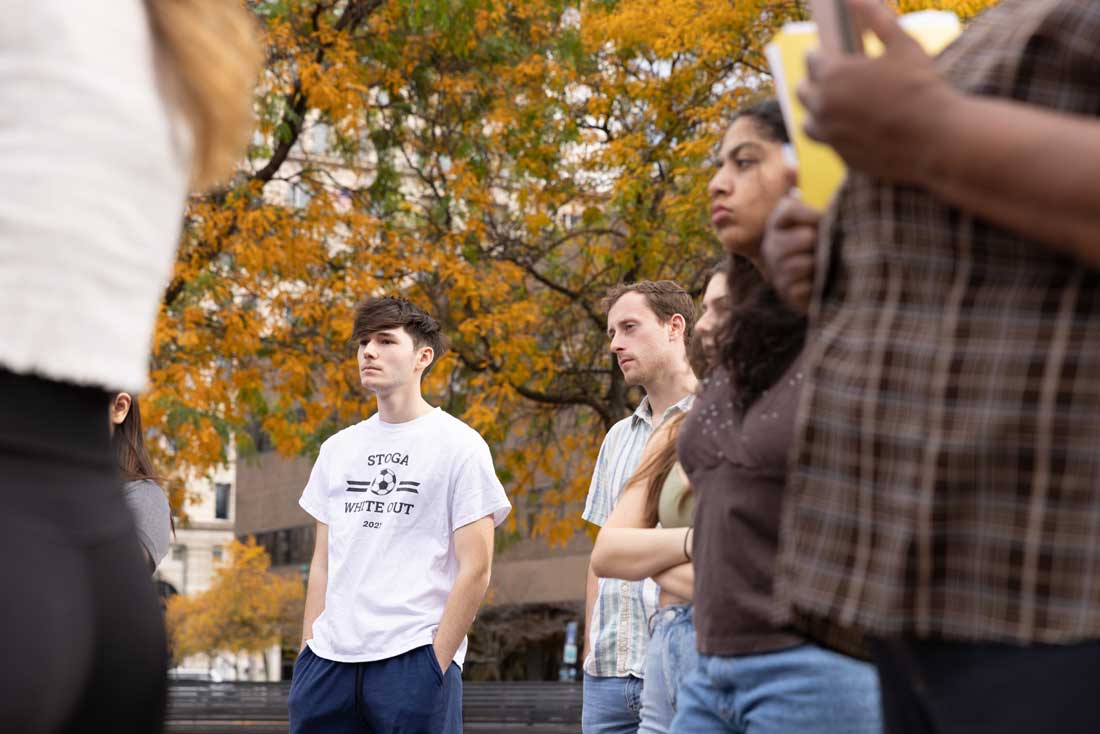
Carson Wright ’26
After hearing the statistic that 33 percent of kids in Syracuse are not ready for kindergarten, my eyes were opened. I wanted to learn more about the city because I was able to see how poverty stricken the downtown area is. I never knew that so many different families had the same path as the people who lived before them. In Syracuse, kids have a hard time going to school because of multiple factors that contribute to their impaired learning, whether these factors are lead poisoning, violence, or just parents not knowing how to prepare their kids for the early stages of school.
On the tour I learned about the Dunbar Center, which has been around for over 100 years trying to get people the help they need.
I believe that you truly must be in Syracuse to learn about how things were, because I honestly had no clue what it was like for people living in poverty until I learned about it in social work class and toured the city. The Jerry Rescue was cool to me because I didn’t even know that happened, and it was amazing because we were standing right where it happened, across the street from the jail where he was held.
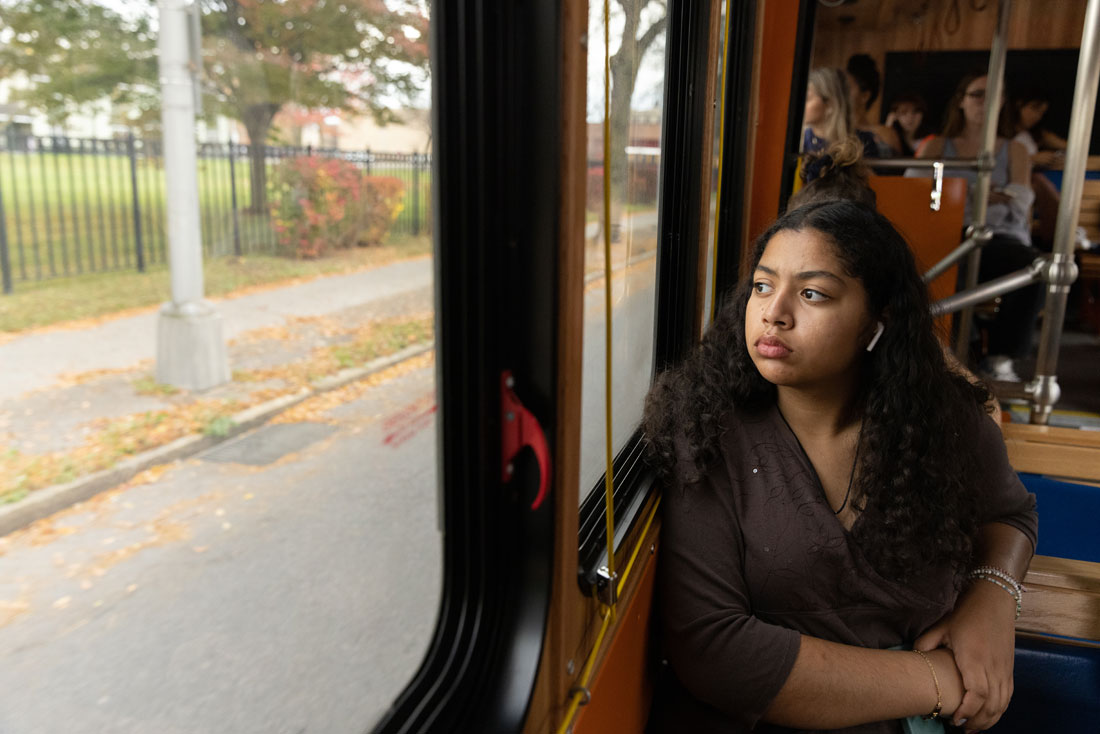
Layla Soberany ’26
Pioneer Homes is one of the oldest housing projects in the country, and they are still used for many low-income residents.
I feel this is where social work skills and workers can come in to help solve these problems. If there are people living in actively unfit conditions and people need help, as a social worker I would find more suitable living areas and be there to provide for the ones seeking help. I can find out how to improve their homes as a group and community.
One example I feel that a social worker will come into play in Syracuse would be the jail at the center of the city. This can not only be an opportunity to provide for those inside the jail, but also the community who have been to jail and are out. We can help those coming out of jail new to the current lifestyle, or those who may have families suffering with a loved one inside. Either way, I feel like there is always room for social work to be able to thrive in Syracuse. With the extreme rates of poverty and endless violence that runs in the city, there is always a time and space for the aid of a social worker. The current community needs the support from others on macro and micro levels throughout the entire city.
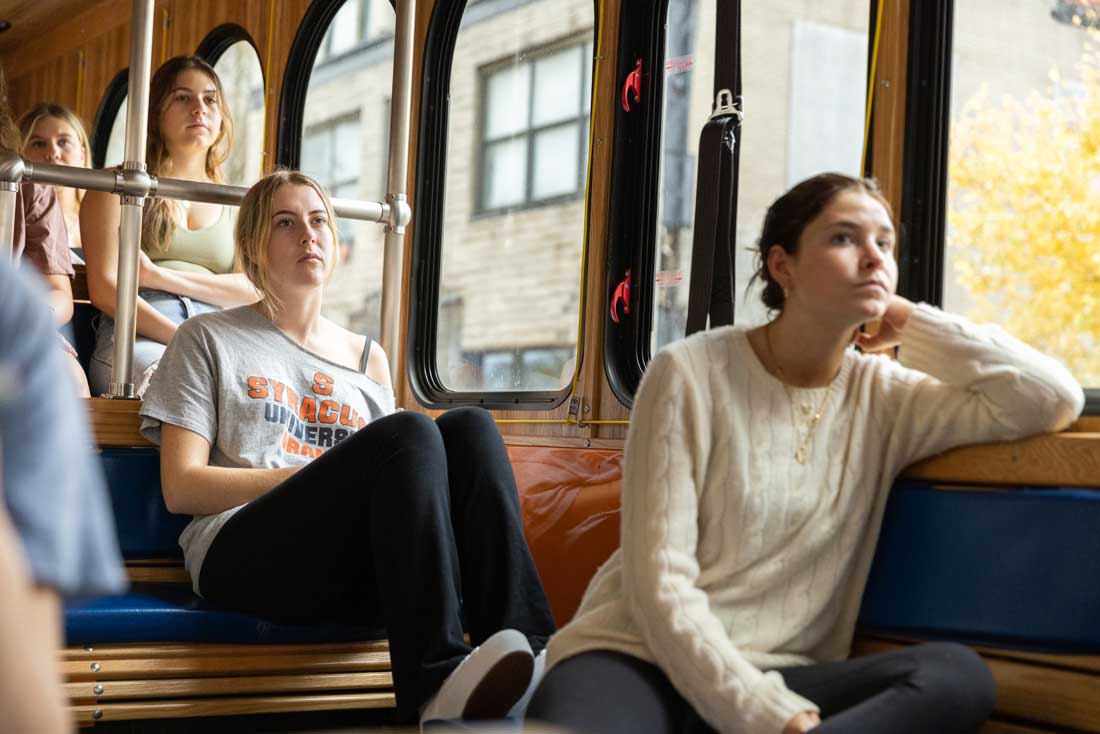
Chyler Rosenberg ’26
Before attending the University, I lacked any knowledge on the complex history of Syracuse or the lives of its residents. For example, the city was a pivotal place during the Civil War and many influential abolitionists spoke and fought to free slaves. Syracuse hosted feminist leaders and women’s rights conventions, it was home to settlement houses, and had an impressive salt market in its prime. Syracuse is much more than what meets the eye, and I am very appreciative that I had the opportunity to hear about its history–the good and the bad.
The issues facing Syracuse and its residents are ongoing, and social workers are at the heart of finding the solutions. In the South Side of Syracuse, the schools are worse, poverty is extremely concentrated, and there is a lot of violence. The fact that the more recent generations are facing the consequences of the past is disappointing.
One improvement the city plans on enacting to address some of these obstacles is remodeling Highway 81. This highway divides Syracuse into four sections and largely contributes to the segregation of the city. We can only hope that by redoing this highway the lives of residents improve, but it will take a long time to reconstruct both the highway itself and address the repercussions it has caused.
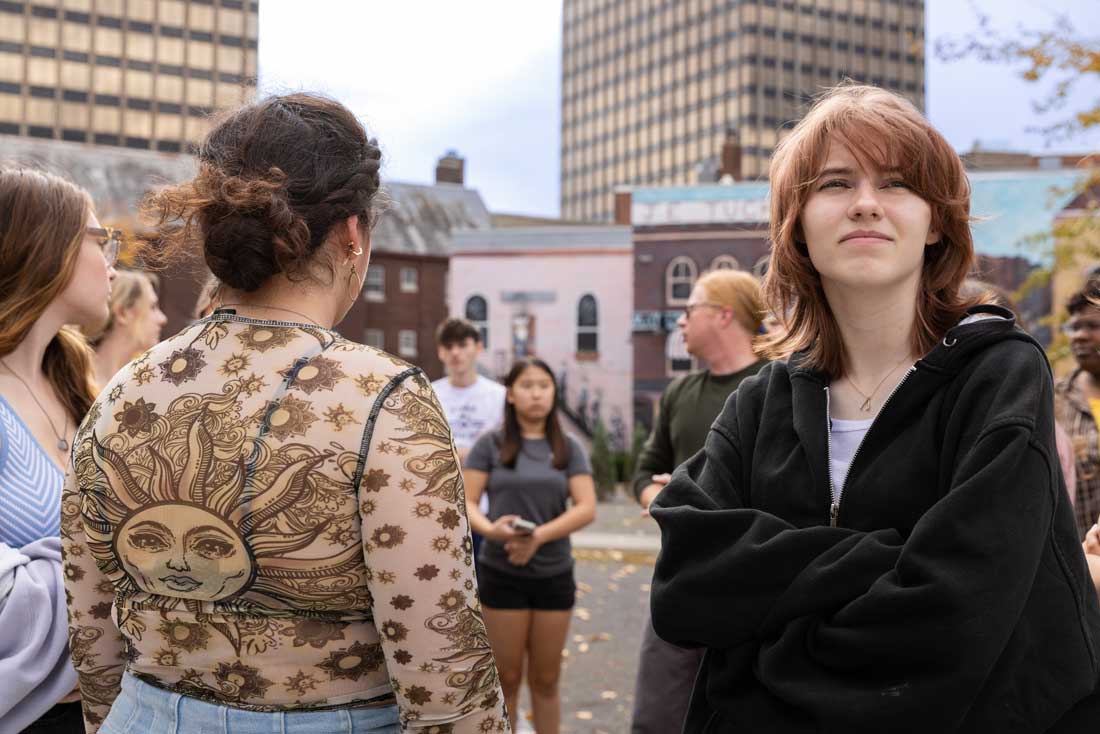
Lily Kuzminski ’26
Syracuse is regarded as one of the poorest and racially segregated places in the United States. Over time, the city has been divided into sections, the southern/western parts of the city are established as the most impoverished, and the most in need. The southern side of the city is where around 90% of the African American population lives.
With new consideration and plans to take down I-81 and replace it with a street-level grid, there is hope for the hard-hit community that surrounds it. By taking a hard look at the harms done to people in the past, there is a real chance for the I-81 project to improve housing conditions, health outcomes, and economic and educational opportunity for all people in Syracuse.
As a social worker, it is incredibly beneficial to understand the realities of the people who inhabit this city, and what structural systems are in place that keep it so heavily segregated and impoverished. It makes me want to spring into action and wish that my individual influence will suffice to make this city a city of progress, and less one based on negligence and racial discrimination. Syracuse’s poverty is derivative of the federal policies made at the expense of people of color, so it is essential to combat these systems through the resources we have at our disposal here at Syracuse.
– Matt Michael
Supporting LGBTQIA+ Youths and Families
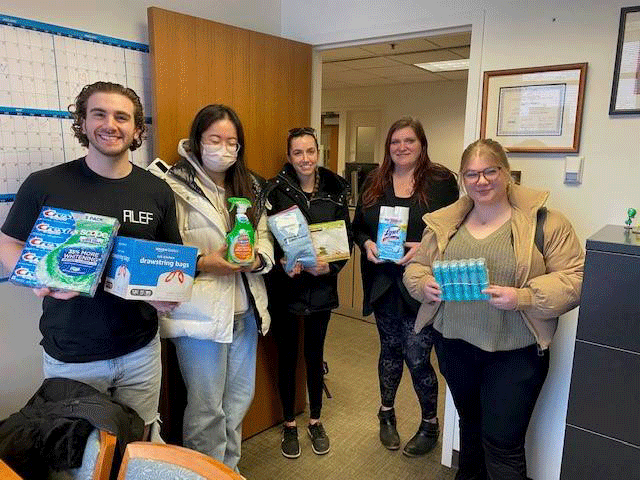
Social Workers United from the School of Social Work at Falk College has selected the Q Center at ACR Health as the beneficiary of its annual Spring Donation Drive.
The Q Center, which has locations in Syracuse, Utica and Watertown, offers a safe space for lesbian, gay, bisexual, transgender, queer, and questioning youth, their families, and allies to gather, share, and receive support. Q Center programming promotes equality, celebrates diversity, provides resources that cultivate pride and leadership skills, and strives to create a safe and inclusive community for all.
Social Workers United is comprised of undergraduate (BSSW) and graduate (M.S.W) students from the School of Social Work.
“We are so excited to be able to help such an amazing organization in our Syracuse community and look forward to the great work ahead of us this semester,” says Jennifer Genovese, an assistant teaching professor and the M.S.W. program director.
For the donation drive, the Q Center provided Social Workers United with a list of items needed to help provide support for LGBTQIA+ youths and their families in Central New York. The items include:
- Menstrual products (liners tampons, pads, menstrual cups).
- Affirming hygiene products for both gender neutral and gendered (deodorant, razors, shaving cream, soap, body wash, toothbrushes, toothpaste).
- Household cleaning supplies.
Social Workers United has provided three ways to donate:
- An Amazon Wishlist to donate safely and securely through Amazon.
- Through the mail to Syracuse University School of Social Work, 244 White Hall, Syracuse, NY 13244
- In person at the School of Social Work office at 244 White Hall on the Syracuse University campus.
ACR Health is a not-for-profit, community-based organization providing support services to a wide range of individuals. Q Center programming includes case management, after-school programs, support groups, outreach and education, special events, school-based GSA support/education, and free LGBTQ-affirming HIV/STD testing.
If you’re unable to donate items through any of the methods provided and would like to donate, please contact Jennifer Genovese at jgenoves@syr.edu. To learn more about social work academic programs, career paths, and experiential learning opportunities, visit the School of Social Work webpage.
Meet Sheriah N. Dixon G’12
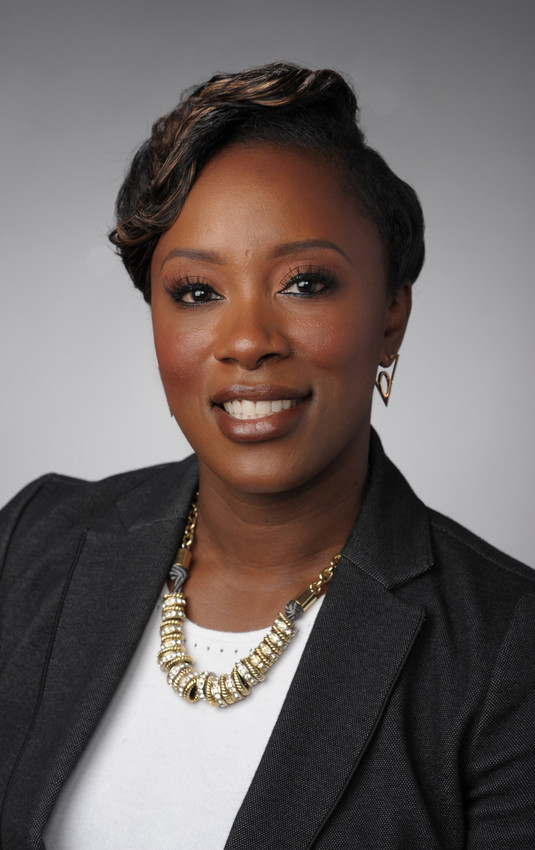
On Nov. 1, the Syracuse University Division of the Student Experience named Sheriah N. Dixon G’12 the dean of students, leading the teams in Community Standards, Parent and Family Services, Remote Programs Student Support, Student Title IX Case Management and Student Outreach.
While Dixon may be new to the role, her connection to Syracuse University began nearly 15 years ago when she arrived as an assistant residence director in Flint Hall. During this time, Dixon balanced working while also pursuing a master of social work degree at the Falk College of Sport and Human Dynamics. She then went on to spend more than five years at Onondaga Community College in leadership roles in residence life and student conduct.
Returning to the University in 2018, Dixon was hired as an equal opportunity and Title IX investigator. Building upon her experience in student conduct and Title IX, Dixon then took on the role of director of Community Standards. For more than four years, she oversaw the University’s student conduct system, collaborated with campus partners to address student behaviors and promote welcoming, inclusive communities, and supported recruitment and training for conduct boards.
“Sheriah’s professionalism, student focus, broad experience and demonstrated leadership made her well-positioned to take on this critically important role in our division. In her first few months, her positive impact on our students and families can already be felt,” says Allen Groves, senior vice president and chief student experience officer.
Now that Dixon has settled into her new role, we asked her four questions to learn more about her and what to expect as she starts her first spring semester as dean of students.
What made you interested in working in student affairs?
College was hard. I struggled my first two years and didn’t feel prepared because I didn’t know how to study, I had culture shock, I was insecure, I was nervous and my mom was paying for college, so I felt obligated to work to help with extracurricular things I wanted and needed.
During this really critical time in my college experience, my advisor, the director of residence life, a financial aid counselor and a faculty member—people I am still close with today—all played a huge role in my success. I became a resident advisor and an orientation leader, and I worked for the Alumni Office. The support I got from them, the advice I received and the encouragement, all helped me walk across that stage. Their guidance and support helped me to develop the confidence I have now and helped me realize that I wanted to do the same for others.
From those experiences, I knew I wanted to work with college students and be on a college campus. I wanted to give back and support students who struggled like me, empowering them to meet and overcome challenges. I wanted to work with parents and give them advice on how to support their students while they are in college. My mom was there every step of the way when I went to college and did all she could to support me and give me opportunity. I wouldn’t be the woman I am today without her.
What are you most looking forward to in your role as dean of students?
I am looking forward to getting to know our students and their families on a more personal level. College can be hard and being a parent or support person can be hard. In those times, I want them to know we are here to support them every step of the way the best way we can. We are also here to support them in achieving their goals and celebrating their successes.
The dean of students team comprises five distinct units. How does your team work together to enhance the student experience?
While our team may have different specialties and areas of focus, we all have a common goal—to provide support to students and families as they grow and develop. We all work together to help our students and families understand expectations, provide guidance and support when there is a concern, and empower students to develop critical life skills, like independence, accountability, self-advocacy and resiliency.
What are your top priorities for the spring semester?
First and foremost, attending as many events as I can to meet and engage with students. In my first few months in the role, I have already had the opportunity to connect with students and families and hear their stories, provide support or address concerns. Listening to our students and families has and will continue to be a top priority for me in this role. I also want to continue to get to know the talented staff on my team and the dedicated campus partners who all play a part in shaping the student experience.
First and Goal
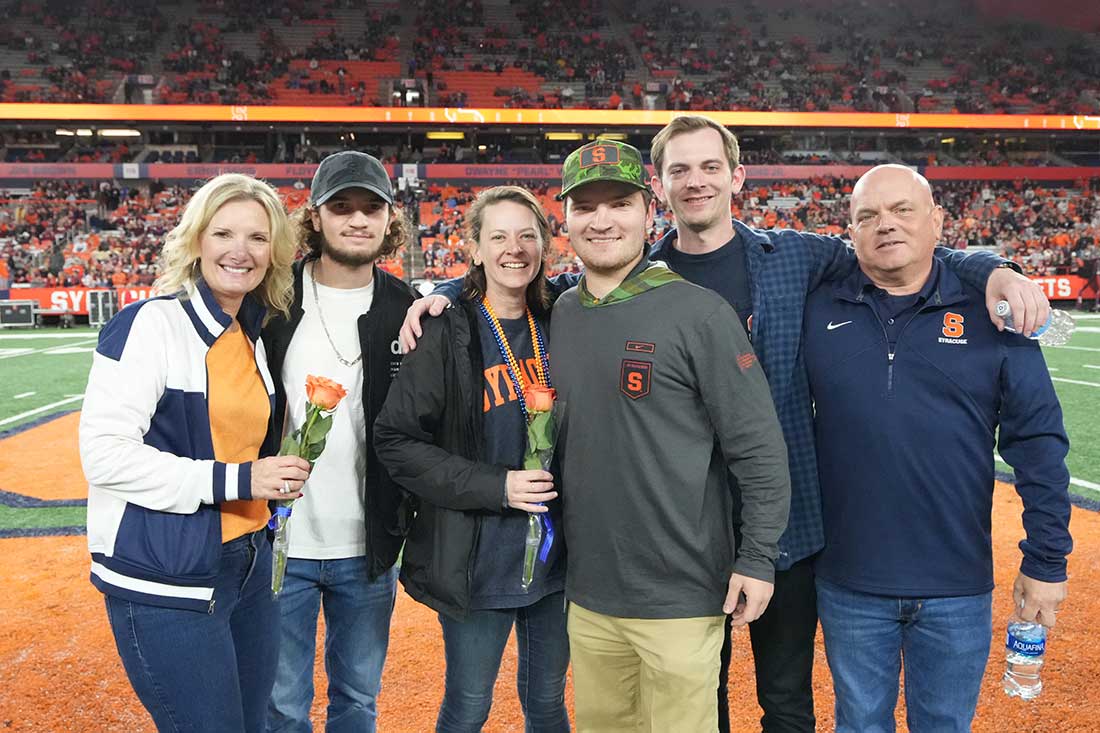
Montgomery, a former NFL star running back and Super Bowl-winning assistant coach, was at Duke University watching his son participate in a football camp. Montgomery says when he looked across the field, he couldn’t help but notice Sobczak, who was born with cerebral palsy and had difficulty walking.
Sobczak, a high school sophomore who had dreams of coaching in the NFL, was talking to a Duke coach who told Sobczak that if really wanted to coach football, he needed to talk to that man over there. He was pointing at Montgomery.
“I saw the struggle he was going through just to walk,” Montgomery says. “But he walked all the way around to the other side of the field to ask me if he could visit me sometime and talk about football. What drew me to David right away was watching this young man being a competitor with what he was dealing with.”
Montgomery, who has become Sobczak’s most trusted mentor, learned that day what many other football coaches and players have learned over the last several years: Never underestimate David Sobczak.
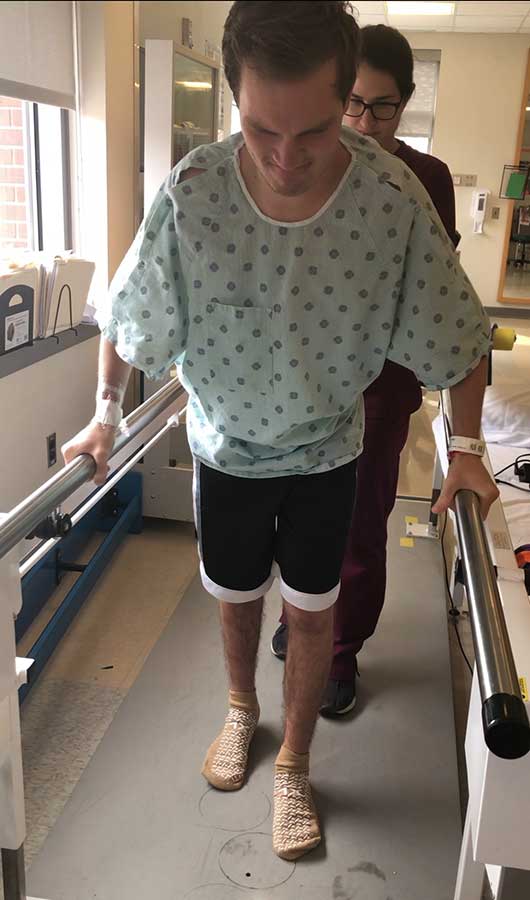
Now a Syracuse University senior, Sobczak is walking without braces following multiple surgeries, and he’s finishing his fourth and final season as an offensive student assistant coach at Syracuse under head coach Dino Babers. On Dec. 29, the Orange will make their first bowl appearance since 2018 against the University of Minnesota in the Bad Boy Mowers Pinstripe Bowl at Yankee Stadium in New York City.
Sobczak is on track to graduate this spring with a degree in social work from the Falk College of Sport and Human Dynamics. He gravitated toward social work and helping others because of the time he spent in hospitals with other children and families who didn’t always have the resources to get the help they needed.
Once he’s established as an NFL coach, Sobczak says he’d like to create a foundation to help families with their children’s hospital bills and serve as a role model for those with disabilities who have dreams of their own.
“The biggest thing I always remind myself is that I have an opportunity to do something bigger than myself,” says Sobczak, a Maryland native who was born in Kingsville and now lives in Owings Mills. “I’m not saying by any chance that I’m going to save the world; I’m not. But there might be a kid down the road who looks at me and says, ‘Hey, if he can do it, I might be able to do something, too.’”
‘See His Personality’
Cerebral palsy is a congenital disorder that affects movement, muscle tone, and posture. It’s caused by damage that occurs to the developing brain, often before birth, and isn’t always noticeable in the first year or so of a child’s life.
When Sobczak was about 15 months old, he wasn’t walking yet and had trouble sitting up. His parents, Dee Anna and David Sobczak, enrolled their son in an infant tumbling program, but the teacher who been running the program for 20 years said she observed that David’s movements were different than the other children.
His parents eventually took David to a neurologist, who ran several tests and determined that he had cerebral palsy. But it wasn’t degenerative, meaning that through braces, surgeries and physical therapy, David would still be able to walk.
Naturally, Sobczak was frustrated by the braces that went right below his knees, the bigger shoes he had to wear for support, and the constant trips and stumbles. Mean kids on the playground threw sand in his braces, and he was once pushed off a swing and had to get stitches in his head “just because I walked weird.”
But two things happened during his childhood that would change the course of Sobczak’s life. He fell in love with football, and he developed a dynamic personality and a gift to talk with anyone at any time about anything, especially football.
“David’s baby brother came along when David was 2, and whenever they met people before Danny could talk, David started to do this thing with his personality to get people to engage with him talking and laughing,” Dee Anna Sobczak says. “He was able to get people to see his personality before they saw he was walking differently. He developed that skill at a very young age, and to this day he has that ability.”
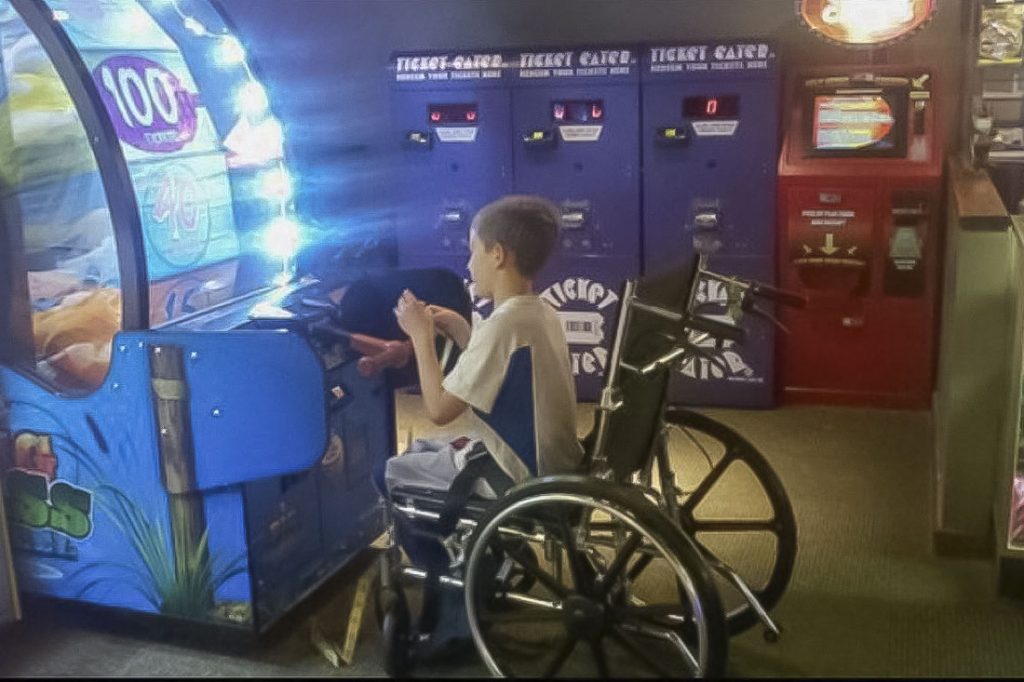
‘What Can I Do?’
Sobczak’s first memories of football are watching games with his father, David, and maternal grandfather, Richard “Pop” Lutz, and going outside to throw the football with them at halftime. Only later, after Lutz had died while Sobczak was in middle school, did Sobczak discover that Lutz was a Syracuse University football fan.
Sobczak played flag football in elementary school but had to stop when boys his age started playing tackle football. By the time he reached middle school, he already had two surgeries: One at 9 to cut and lengthen the spastic muscles in his legs so they would grow with his bones; and one at 11 to create arches on the bottom of his feet with cadaver bones.
Through fifth grade, Sobczak attended a Montessori school, which emphasizes a child’s natural interests rather than formal teaching methods. His move to middle school and test-taking was a disaster at first, but in a sign of what was to come, he adjusted and received the most-improved student award in sixth grade.
Still, it was a difficult transition as his physical limitations became more of issue. While his classmates were playing dodge ball in gym class, he was lifting weights. While his classmates were running around at recess, he was meeting with a physical therapist because he repeatedly dislocated his knees.
“You’re like, man, I can’t do the things that other kids do,” Sobczak says. “I had to navigate my world a little faster than others. Meaning, I had to find out early, what can I do?”
And it was during sixth grade that his beloved Baltimore Ravens won the Super Bowl and Sobczak chose a life in football. At first, he wanted to be a commentator. But then, thinking like a true coach, he figured if he wanted to be a great commentator, he’d have to master the sport first, so he should become a coach.
From that point on, Sobczak couldn’t get enough of football. He studied games, read books, and watched the NFL Network 24/7. His parents had trouble getting him to read until he started reading football books, and then they couldn’t get him to stop.
“I had seen him miss out on other enjoyments like riding bikes and running, things he would never be able to do,” says his father, David Sobczak. “To see him get so much joy out of something like learning about football and football coaching, you couldn’t ask for anything more as it became the No. 1 thing that he looked forward to.”
‘Teacher First, Coach Second’
Sobczak’s first coaching “break” came at St. Paul’s high school in Baltimore County, Maryland. Head coach Paul Bernstorf named Sobczak as a student coach assigned to work with the quarterbacks, scout upcoming opponents, and help design game plans.
“I’d stay up late, read as much as I could, watch DVDs (of previous games), and diagram plays,” Sobczak says. “I found football, I found coaching, and it was the first time in my life where I was like, oh, my God, this is something I can do and something that I love.”
In addition to the coaching experience, St. Paul’s provided Sobczak with the opportunity to network with other college and NFL coaches and Sobczak’s contact list ballooned. There are several examples of his networking, but here’s one of Sobczak’s favorites:
The father of one of St. Paul’s quarterbacks at the time is Marty Mornhinweg, a longtime NFL coach who was then the offensive coordinator for the Ravens. After meeting Sobczak, Mornhinweg asked if he wanted to sit in on a meeting of team’s quarterbacks during offseason practice in the spring. So there’s Sobczak, a high school senior, talking Xs and Os with the likes of Super Bowl-winning quarterback Joe Flacco, rookie and future star Lamar Jackson, and Heisman Trophy winner Robert Griffin III.
Not only that, but later at practice Mornhinweg, with the blessing of head coach John Harbaugh, called Sobczak to the sideline, handed him a clipboard, and asked him to call out the plays for Flacco and the offense. That was a daunting moment, even for someone as gregarious as Sobczak.
“If I didn’t have that moment, I would have never would have felt that OK, maybe I can do this,” he says. “There’s one thing of wanting to, and there’s another thing of getting out of your shell and getting comfortable being uncomfortable.”
Sobczak attended about 15 Glazier coaching clinics throughout the country when he was in high school to meet coaches and pick their brains. “He’d be the only kid attending and he grew really comfortable introducing himself to people, talking, and sharing contact information,” Dee Anna Sobczak says.
That’s how he met Montgomery, who played in a Super Bowl with the Philadelphia Eagles and won Super Bowl championships as a coach with the St. Louis Rams and Ravens. When they met at Duke, they realized they lived only 30 minutes apart in Maryland.
“I thought he’d call me, we’d talk a little bit of football for 15 minutes, and that would be it,” Montgomery says, laughing. “But now it’s been six, seven years and we’re still talking.”
Many times, one of Sobczak’s parents would drop him off at Montgomery’s house and they would spend hours talking about the intricacies of football. Since Sobczak has been at Syracuse, Montgomery has emailed him after every Syracuse game to share his thoughts on what happened in the game.
“Coaches, they’re a dime a dozen. But I saw that this guy here wants to be more than a coach, he wanted to be a teacher,” Montgomery says. “A lot of people can coach, but to be a teacher it takes a different kind of guy who wants to do that. That’s how I view David, as a teacher first and a coach second.”
‘Made Me a Better Coach’
To be a successful teacher, you must be able to communicate with your students, show empathy for their individual situations, and build trust. Those are also the building blocks of social work, and that’s why Annette Hodgens–then the assistant director of undergraduate admissions at Falk College–recommended that Sobczak enroll in the School of Social Work.
Social Work Assistant Professor Ryan Heath, Sobczak’s advisor, first met Sobczak at the freshmen orientation meeting. Normally, Heath says, department advisors and their students don’t have serious conversations until the student’s sophomore year. But like with Montgomery years before, Sobczak made it a point to march across the room and introduce himself to Heath.
“David came right up to me after the meeting and introduced himself, which to me signaled one of David’s great strengths, that he is very attuned to, and interested in, pursuing and maintaining relationships,” Heath says.
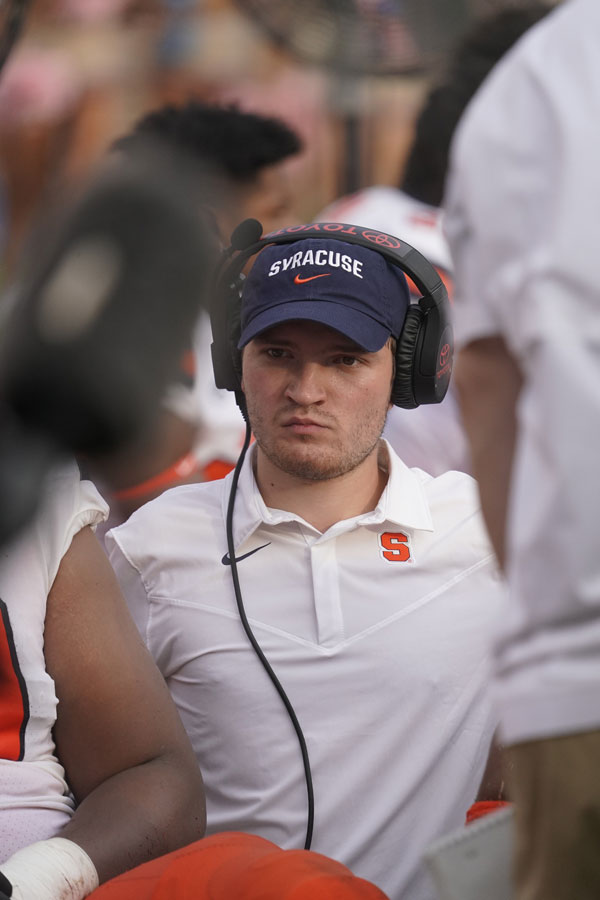
As their relationship developed, Heath says they learned from each other as Heath discovered how social work principles apply to coaching. Sobczak says he appreciates that Heath never tried to talk him out of coaching as his profession.
“It’s made me a better coach because you learn every individual is different, whether it’s in their learning style or the way they interact, and it’s taught me how to reach people who don’t come from the same background,” Sobczak says. “I think that’s a very important tool as a coach, because if you only reach a certain group of guys, it’s going to be hard.”
‘You Wait, Just Watch’
Before he went off to college to pursue his dream, Sobczak had one more surgery in March of his senior year of high school, when he had what he calls his “hockey puck” surgically inserted into one side of the abdomen near his hip bone. Technically called a baclofen pump, the device delivers baclofen, a medicine, directly into the spinal canal to reduce the spasticity of Sobczak’s leg muscles.
Before his surgery, Sobczak had considered several schools and Syracuse was on his list because his high school coach was close with then-Syracuse tight ends/receivers coach Reno Ferri and they had arranged a visit to campus. Sobczak met the coaching staff on his visit and was encouraged that he would get an opportunity to coach.
“When I got my baclofen pump put in my senior year, (Syracuse Director of Player Personnel) coach (Roy) Wittke reached out on behalf of the coaching staff to my mom and asked how I was doing,” Sobczak says. “I was a student coach (in high school) and I’d been on campus, but I never coached a day in my life at Syracuse. When they reached out like that, I said this is where I’m supposed to be.”
It has been quite a ride for Sobczak, who has filled a variety of roles from working with the tight ends, running backs and special teams to scouting to designing plays on a computer for the offensive line to study. He has made friends for life with the players and coaches, and he’s grateful that none of them “looked at me like I have a disability.”
“I learned a lot, I failed a lot, and even with my disability, these guys have been more than supportive, and they’ve treated me just like they do with the other players and the other coaches,” Sobczak says. “Coach Babers has been awesome toward me. Like any good coach, he’s been good to you, hard on you, and he’s given you opportunity and responsibility.”
Following the bowl game, Sobczak will turn his attention to a professional career in the NFL. Montgomery, who has seen Sobczak’s determination first-hand for several years, says he has no doubt Sobczak will be hired by the NFL because when a team interviews him “they’re not going to just be impressed, they’re going to be shocked by his understanding of the game.”
And if all goes as planned, Sobczak will eventually find a way to help those in need who may not have the support system in place that enabled him to realize his dream.
“He has resilience, and he has learned how to take his adversity and turn it into his champion,” Dee Anna Sobczak says. “And he’s not given up. When people say you can’t, he says, ‘you wait, just watch.’”
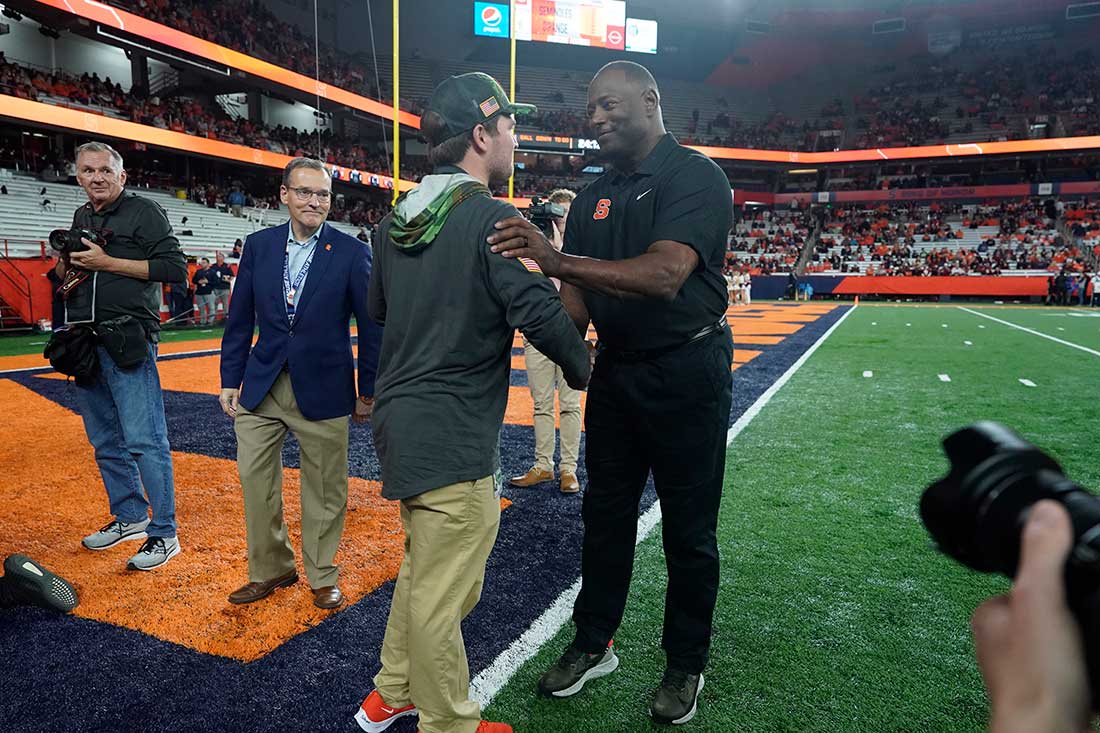
An Open Letter From David Sobczak to Coach Babers and the Syracuse Football Team
“Thank you, everyone, for taking me in. Thank you for giving me my first opportunity. Syracuse has been the best four years of my life. I never thought the best friends in my life would grow up in different places than I did. You gave me friendships and relationships for life. I look at schools all across the country and I can’t imagine myself anywhere else. Through every win, every loss, that’s the way it feels. I love this place and I love this football team. This football team is the reason I came here, and this football team is the reason why I’m going to leave here a better person and better coach than when I came.”
Page 5 of 28
